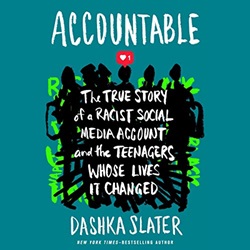
 Accountable
AccountableThe True Story of a Racist Social Media Account and the Teenagers Whose Lives It Changed
Macmillan Young Listeners, 2023. 9 hours, 12 minutes.
Review written April 18, 2024, from a library eaudiobook.
Starred Review
2024 Excellence in Young Adult Nonfiction Award Winner
2024 Capitol Choices Selection
2024 Sonderbooks Standout:
#4 Teen Nonfiction
I did not enjoy listening to this audiobook. But it completely deserves the recognition it's won. This book is on an important and timely topic, and it is thoroughly researched and presented clearly and in great detail, with lots of nuance and with respect for the people involved. It gets you in the heads of all the kids, not simply the ones on one side of the issue, and you fully appreciate how complicated and complex the matter is.
The subtitle explains what's in this book. A high school kid in a small California bay area town made a private Instagram account and invited thirteen of his friends to follow it. He posted "edgy" memes trying to get approval from those friends -- and they got more and more racist, targeting mostly Black girls who attended their high school. The images progressed to pictures of nooses and other horribly racist content.
When the targets found out, it started a big scandal. But staff and administration didn't really know how to handle it. Should those who followed the account but never commented receive consequences, too? The whole high school community got involved and the account followers -- not only the account owner -- were shamed and threatened. Eventually even the courts got involved - mostly as to whether the schools had violated their students' first amendment rights in their response to the account followers.
But every single kid on either side of the event had their life disrupted by it. The girls who were targeted had visceral reactions, from not feeling safe at school to having nightmares and going into deep depression. But the perpetrators, no matter how remorseful they felt, seemingly had no possible way to live it down and get past it, so their lives, too, were dramatically affected.
But shouldn't their lives have been affected? I like the author's choice of title, because that's the question: In what ways should 16-year-old kids be held accountable for terrible things they did when they didn't fully understand how terrible they were? And what is the appropriate way to make them understand? And how can we bring healing to those who were harmed?
Before I listened to this audiobook, I didn't begin to understand how difficult and complex answering those questions can be.
This book is a resource for administrators and teachers everywhere in the age of social media. But I'm especially glad that it's written for teens and targeted to teens, because it's also a cautionary tale and will surely save at least some kids from making similar mistakes.
